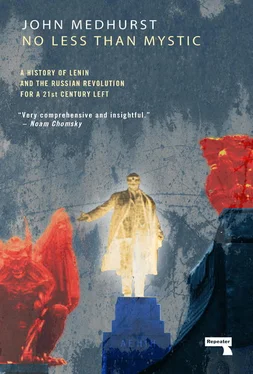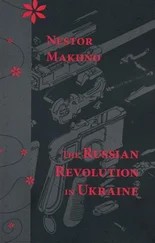All the revolutionary parties have been placed before a fait accompli . A civil war threatens us with an explosion of counter revolution. A peaceful solution of the crisis can be obtained by creating a government which will be recognised by the whole democracy.
The resolution was widely applauded, prompting Sukhanov to note that “a very great many Bolsheviks, not having assimilated the spirit of the teaching of Lenin and Trotsky, would have been happy to take exactly this path”. 3
Many of the delegates, including many Bolsheviks, had taken at face value Trotsky’s declaration that the MRC was simply an expression of the will of the Soviet and its actions were intended to defend the Soviet by creating a government answerable to it. Martov’s resolution, which encapsulated this position, was therefore strongly supported by Bolsheviks, Mensheviks, the independent socialists around Gorky’s paper Novaya Zhizn , and the Left SRs. With this base of support Trotsky had to backtrack. He sent Lunacharsky to the podium to declare that the Bolsheviks agreed with the resolution. It was voted upon and passed unanimously.
Then history turned. Martov had backed the Bolsheviks into a corner. They had little choice but to accede to his resolution and agree to a socialist coalition government. The non-Bolshevik socialists had won as much as they could possibly expect to win at that moment. They then, for reasons that remain unclear but were probably a mixture of confusion, tiredness and misunderstanding, threw it all away.
Without consulting Martov, the Right Menshevik Khinchuk declared on behalf of the Mensheviks that the policy of the Congress should be to negotiate an agreement with the now defunct Provisional Government. He told the Congress that they would under no circumstances enter a government with the Bolsheviks, and therefore “divest ourselves for all responsibility for what is happening, and leave the Congress, and ask the other fractions to meet to discuss the present situation”. The Congress greeted this with surprise and anger, despite which Geldeman for the SRs and Ehrlich for the Bund declared they were also leaving. Most delegates of these parties departed the hall amidst jeers, curses and cries of “Traitors!” and “Kornivalites!” and “Counter-revolutionaries!”
By this action, the Mensheviks, Bundists and Right SRs fatally discredited themselves in the eyes of the most active representatives of the working class. They also left Martov alone on the platform to face Trotsky. Trotsky was not known for his mercy and he did not display any now. “What has taken place”, he said with cruel logic and withering scorn,
is an insurrection, not a conspiracy. An insurrection of the popular masses needs no justification […] our insurrection has conquered, and now you propose to us: renounce your victory, make a compromise. With whom? I ask: with whom ought we to make a compromise? With that pitiful handful who just went out? Haven’t we seen them through and through? There is no longer anybody in Russia who is for them […] A compromise is supposed to be made between two equal sides. Here no compromise is possible. To those who have gone out, and to all who have made like proposals, we must say: you are pitiful, isolated individuals. You are bankrupt. Your role is played out. Go where you belong–to the rubbish heap of history!
The hall applauded wildly, seemingly blind to the fact that Trotsky had not only buried those who had just left the Congress but had also repudiated–through his dismissal of “all who made like proposals”–the resolution that the Congress had passed unanimously in favour of a government of all the Soviet parties. Between the Bolsheviks who rejected this approach and the Mensheviks/Right SRs/Bundists who had just walked away, there was now little left of it save a few moderate Bolsheviks and Left Mensheviks like Martov, who stood insulted and humiliated on the platform. In a fit of anger, he shouted, “Then we’ll leave!” and began to walk towards the exit. Before he could reach it a young Bolshevik worker, Ivan Akulov, stopped him. “And we amongst ourselves”, Akulov said bitterly, “had thought Martov at least will remain with us”. Martov was taken aback, torn between his disgust with the Bolsheviks and his desire to stand with the Russian working class no matter what. “One day you will understand the crime in which you are taking part”, he said quietly, and left Smolny. 4
The Mensheviks wavered between broad right and left factions. The Jewish Bund was for the moment more cohesive (although a breakaway group called Poalei Zion, advocating a mixture of socialism and Zionism, began to attract support amongst Jewish workers after the Balfour Declaration of British support for a Jewish homeland in Palestine). An emergency session of the Bund’s Central Committee held in Minsk a few weeks later declared the Bolsheviks must assume full responsibility for
the insurrection and civil war that was begun by them against the will of the majority of the revolutionary democratic parties during the two weeks before elections to the Constituent Assembly, where the problems of re-organising the structures of power could have been achieved in concert with all of the revolutionary democratic forces.
The CC’s resolution warned that by isolating themselves from the broad democratic forces that had made the February Revolution, the Bolsheviks would inevitably have to sustain themselves in power by “means that would suppress democratic freedoms and condone unchecked terror, which is always a characteristic of government by a minority”. 5
The resolution was a statement of principle. Although it formally rejected the October Insurrection, the Bund leader and Left Menshevik Raphael Abramovich counseled against taking up arms against the Bolsheviks as he felt that to do so when they were under attack from Kerensky’s forces would be counter-productive, and would drive workers into their arms. Other Bundists such as Mark Liber were more viscerally hostile to the Bolsheviks and began to plan physical resistance (Liber was so out of step with Menshevik and Bund policy that he lost his leadership positions within both groups, eclipsed by those like Abramovich, Martov and Dan who sought an accommodation with moderate Bolsheviks). The Eighth Congress of the Bund, its last on Russian soil, was held in December 1917, with 100 representatives of the party covering 357 local branches and 40,000 members. The congress overwhelmingly opposed what they called the methods of Blanquism– coup d’état led by a minority–and demanded that the Constituent Assembly be properly elected and become the prime legislative body of the democratic republic.
The SRs, literally split into Left and Right, took less nuanced positions. The Left SRs, led by the legendary freedom fighter Maria Spiridonova, were dazzled by the audacity of the Bolshevik insurrection and inclined to support it. The majority of SRs were not. They regarded the insurrection as an illegitimate power play that had removed a government in which SR ministers played a key role, and had pre-empted imminent elections to the Constituent Assembly. Victor Chernov, having made every effort to make the Provisional Government work and to deliver redistribution of landed estates to the peasants, prepared for the Constituent Assembly elections. Other SR leaders such as Avram Gots, who had not been uncritical of Kerensky and the Provisional Government, favoured armed resistance to Sovnarcom. Gots helped set up the “Committee of Salvation of the Homeland and the Revolution”, which attempted to mobilise a popular militia to resist the Bolshevik government.
Despite opposition from the Mensheviks, the SRs and the Bund, the Bolsheviks had avoided their nightmare scenario–that the Second Congress would vote against the insurrection and demand a broad-based socialist government (although it had actually supported that proposal, only to have its movers self-sabotage it). Delegates from the All-Russian Union of Railwaymen had demanded that any new government be a socialist coalition, but they were voted down. Many present seemed for a moment to ignore the world beyond the walls of the Second Congress. It did not ignore them.
Читать дальше












